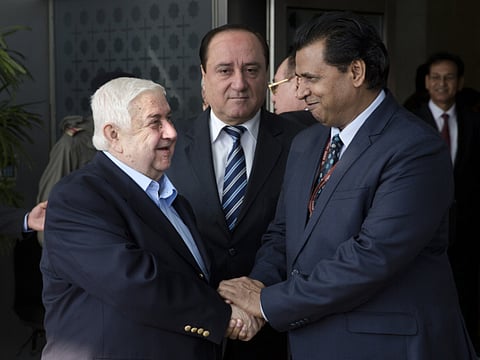Why Syria’s regime needs India and China
While Asian countries favour the regime they also have an interest in ending the conflict

Dubai: Bashar Al Assad’s embattled Syrian regime is wooing Asia’s powers to bolster his international standing ahead of peace negotiations later this month.
Foreign Minister Walid Al Mu’allem arrives in New Delhi yesterday, the highest ranking Syrian official to visit India since 2011, to push for Prime Minister Narendra Modi to get more involved in resolving the dispute. Last month he was in Beijing for talks with Chinese leaders, who have recently taken on a more active role in brokering a deal with Al Assad’s adversaries.
“India and China have similar positions that are implicitly favorable to the Syrian regime in that they both oppose regime change by force,” said Kanchi Gupta, a West Asia expert at the New Delhi-based Observer Research Foundation. “Their positions on the conflict would be watched carefully by the West and the Gulf, and thus Syria sees greater merit in lobbying them.”
Negotiations on Syria’s future are scheduled to begin in Geneva on Jan. 25. The United Nations Security Council unanimously adopted a resolutionlast month calling for a transitional government within six months and elections within 18 months to end a conflict that has killed more than 250,000 and triggered the world’s biggest humanitarian crisis since World War II.
Despite that breakthrough, a list of divisive issues was left unanswered - none bigger than the question of whether Al Assad stays or goes.
Iran and Russia have backed the Syrian leader, while the US, Europe and Saudi Arabia insist Al Assad must step aside as part of any settlement. That position appeared to ease after terrorist attacks in Paris last November left 130 people dead.
In China, Al Mu’allem announced that Syria was ready to participate in the UN-backed peace talks, a reversal for a regime that had previously ruled out negotiating with what it called “terrorists.” This week he’s likely to push for India to take a more vocal role in resolving the nearly five-year conflict.
“The timing is very relevant given the Al Assad regime knows India and China see the Middle East as a region of future strategic competition between the two giants,” said Kadira Pethiyagoda, visiting fellow in Asia-Middle East relations at the Brookings Doha Centre.
“Syria can lobby India by outlining the support that China has promised, appealing to Delhi’s objective of not being outshone by China.”
India’s actions in the UN Security Council have tilted in favor of the Al Assad regime, opposing or abstaining from moves that either condemned Al Assad or called for him to step down. Among its closest strategic partners is Russia, which entered the Syria conflict in September with airstrikes to bolster Al Assad.
This week Al Mu’allem is set to hold talks with India External Affairs Minister Sushma Swaraj. He’s also expected to meet Indian Prime Minister Narendra Modi and National Security Advisor Ajit Doval, according to local media reports.
“India is in a rare position where it has good relations with both Syria and the big world powers,” Syria’s Ambassador to India Riad Kamel Abbas told the Telegraph last May. “We would really like India to play a more proactive role.”
Feuding between Saudi Arabia and Iran may give an impetus for both China and India to ensure that the peace talks don’t get derailed. India depends on the Saudis for oil and is working with Iran on port, energy projects and transit routes to access resource-rich Central Asia.
“Both countries are in the phase of giving greater impetus to their Middle East policies, and Syria could emerge as a critical element if Saudi-Iran tensions escalate,” said Gupta from the Observer Research Foundation. “So Syria understands that India and China would want the crisis to be resolved sooner than later.”



